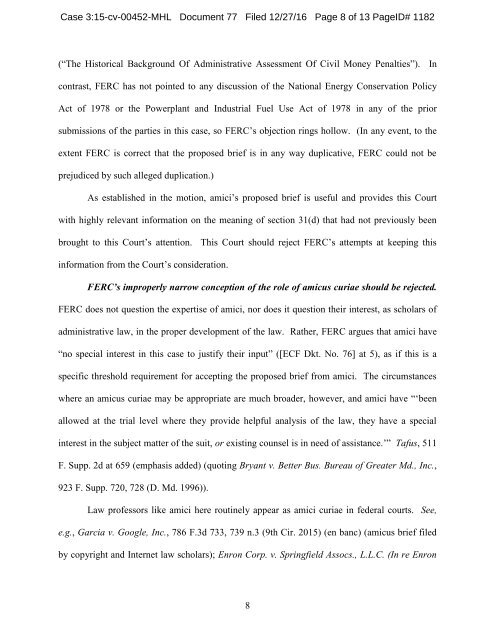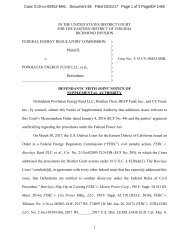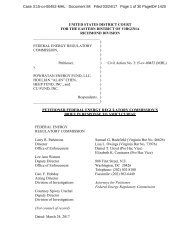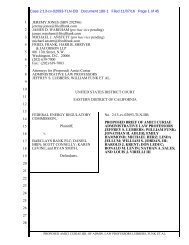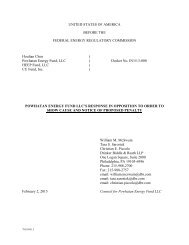Reply-ISO-Motion-for-Leave-to-File-Brief-as-Amici-Curiae
Reply-ISO-Motion-for-Leave-to-File-Brief-as-Amici-Curiae
Reply-ISO-Motion-for-Leave-to-File-Brief-as-Amici-Curiae
Create successful ePaper yourself
Turn your PDF publications into a flip-book with our unique Google optimized e-Paper software.
C<strong>as</strong>e 3:15-cv-00452-MHL Document 77 <strong>File</strong>d 12/27/16 Page 8 of 13 PageID# 1182<br />
(“The His<strong>to</strong>rical Background Of Administrative Assessment Of Civil Money Penalties”). In<br />
contr<strong>as</strong>t, FERC h<strong>as</strong> not pointed <strong>to</strong> any discussion of the National Energy Conservation Policy<br />
Act of 1978 or the Powerplant and Industrial Fuel Use Act of 1978 in any of the prior<br />
submissions of the parties in this c<strong>as</strong>e, so FERC’s objection rings hollow. (In any event, <strong>to</strong> the<br />
extent FERC is correct that the proposed brief is in any way duplicative, FERC could not be<br />
prejudiced by such alleged duplication.)<br />
As established in the motion, amici’s proposed brief is useful and provides this Court<br />
with highly relevant in<strong>for</strong>mation on the meaning of section 31(d) that had not previously been<br />
brought <strong>to</strong> this Court’s attention. This Court should reject FERC’s attempts at keeping this<br />
in<strong>for</strong>mation from the Court’s consideration.<br />
FERC’s improperly narrow conception of the role of amicus curiae should be rejected.<br />
FERC does not question the expertise of amici, nor does it question their interest, <strong>as</strong> scholars of<br />
administrative law, in the proper development of the law. Rather, FERC argues that amici have<br />
“no special interest in this c<strong>as</strong>e <strong>to</strong> justify their input” ([ECF Dkt. No. 76] at 5), <strong>as</strong> if this is a<br />
specific threshold requirement <strong>for</strong> accepting the proposed brief from amici. The circumstances<br />
where an amicus curiae may be appropriate are much broader, however, and amici have “‘been<br />
allowed at the trial level where they provide helpful analysis of the law, they have a special<br />
interest in the subject matter of the suit, or existing counsel is in need of <strong>as</strong>sistance.’” Tafus, 511<br />
F. Supp. 2d at 659 (emph<strong>as</strong>is added) (quoting Bryant v. Better Bus. Bureau of Greater Md., Inc.,<br />
923 F. Supp. 720, 728 (D. Md. 1996)).<br />
Law professors like amici here routinely appear <strong>as</strong> amici curiae in federal courts. See,<br />
e.g., Garcia v. Google, Inc., 786 F.3d 733, 739 n.3 (9th Cir. 2015) (en banc) (amicus brief filed<br />
by copyright and Internet law scholars); Enron Corp. v. Springfield Assocs., L.L.C. (In re Enron<br />
8


